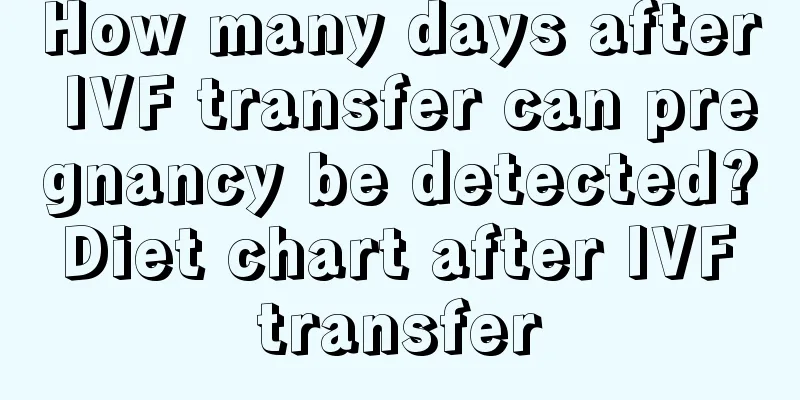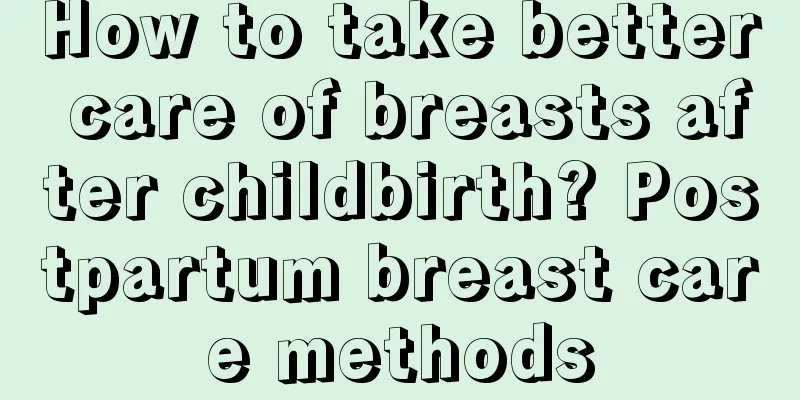How many days after IVF transfer can pregnancy be detected? Diet chart after IVF transfer

|
IVF can effectively help infertile couples conceive. So how long does it take to detect pregnancy after the IVF is transplanted into a woman's body? What can you eat after IVF to help you get pregnant? Let's learn more about it~ How many days after IVF transfer can pregnancy be detectedPregnancy is a woman's nature. Many modern women are infertile due to various reasons. The emergence of test-tube babies has brought them hope. After the test-tube baby transplant, expectant mothers are eager to know whether they are pregnant. They often ask doctors how many days after the test-tube baby transplant can they confirm pregnancy? According to IVF experts, if IVF is successful, it can be detected by blood test 14 days after the transfer. 14 days is the best time to check. 3 to 5 days after the IVF embryo transfer, the embryo invades the endometrium and implants, and its trophoblast cells secrete hCG. Generally, hCG is tested in the blood 14 days after the transfer to determine whether the pregnancy is present. A vaginal B-ultrasound is performed 28 to 30 days after the transfer. Clinical pregnancy can be diagnosed only when the gestational sac and embryo heartbeat are seen under ultrasound. The embryo implantation of IVF usually takes about 3-4 days, but it may be delayed. This is mainly determined by individual differences. The better the quality of the embryo, the easier it is to implant. This requires prospective parents who are doing IVF to be fully prepared for pregnancy in advance. Another factor that affects the implantation of IVF embryos is the condition of the female endometrium. An unfavorable environment has a great impact on conception. This requires female friends to fully check their bodies during pregnancy and treat all inflammations. What to eat after IVF transplantationThere are many things to pay attention to after IVF transplantation, and daily diet is one of them. The following editor will introduce to you what to eat after IVF transplantation. 1. Choose an easily digestible diet After the test tube transplant, you will have to rest and stay in bed, which will reduce your exercise. At this time, you may have a decreased appetite and indigestion. Therefore, it is important to choose easily digestible foods. For example, you can drink some rice porridge, have some soup, and other foods that help digestion. 2. Avoid constipation Because during the IVF transplant, constipation is easy to occur. In order to prevent or alleviate the symptoms of constipation, pregnant women can eat more foods rich in dietary fiber to promote defecation, such as celery, cabbage, celery, lotus root, yam, etc. 3. Avoid diarrhea At this time, you should pay special attention to your diet and avoid eating in small restaurants without hygiene guarantees. It is best to choose a clean and tidy environment to eat in order to prevent diarrhea. 4. Avoid eating foods that may cause allergies It is also easy to have allergic reactions after IVF transplantation. At this time, you should pay special attention to your diet and avoid eating foods that are prone to allergies, such as seafood. In addition, you should stay away from these allergens to avoid allergic reactions during the transplantation process. 5. Eat a high-protein diet Before the test tube transplant, the patient will be given ovulation-inducing drugs to promote ovulation, which can easily cause ovarian hyperstimulation. Such patients initially experience abdominal distension and other discomforts. At this time, try to eat high-protein, easily digestible foods and small, frequent meals. 6. Eat less After the transplant, patients are more sedentary than active and eat more delicately. In addition, they use progesterone drugs, feel anxious, have poor sleep, and often feel bloated. Therefore, they should follow the principle of eating small bites when eating. Precautions after IVF transplantationAfter all, IVF is an artificial conception procedure, and it is not as safe as a natural pregnancy. Therefore, there are many precautions that expectant mothers need to pay attention to after IVF, especially to get more rest and make good dietary arrangements after IVF. 1. After the IVF transfer, you should start to rest in bed for 48 hours after returning home. You can take any sleeping position, but it is best not to get up except to use the bathroom. If you feel tired after lying for a long time, you can also recline on the bed, but the reclining angle must be less than 45 degrees. 2. After the IVF transplant, do not take a bath within 48 hours to avoid catching a cold. 3. After the IVF transfer, the expectant mother should avoid intense exercise and should not participate in activities that require strength, such as jogging or cycling. You can take a slow walk, which is good for your health and safety. 4. Don’t overwork, take more rest and get enough sleep. Don’t rest too late. It is best for working mothers to take a leave of absence and rest for a while, and then go back to work after the embryo is stable. 5. Keep a healthy and optimistic attitude, don't worry about gains and losses, and don't be afraid of unstable embryos. Bad emotions will affect your health. 6. After the test tube baby transplant, if the expectant mother has abnormal abdominal pain, bloating, vaginal bleeding and other symptoms, she should contact the hospital immediately so that the fetus can be preserved immediately. 7. After the IVF transplant, the expectant mother's diet needs to be changed and arranged reasonably. Some taboo foods must not be eaten too much, so as not to affect the stability and development of the embryo. |
Recommend
What diseases can Sanjiu moxibustion treat? What are the precautions and taboos after applying Sanjiu moxibustion?
Everyone is familiar with Sanjiu moxibustion, so ...
How to name a newborn baby? What are the methods for naming a child?
Everyone must have heard of a lot of weird names ...
How to treat insufficient milk after childbirth? Five treatment methods for you to choose
The most embarrassing thing about feeding a baby ...
What should men pay attention to when preparing for pregnancy? What should they eat when preparing for pregnancy?
Our living conditions are better now. Generally, ...
Will episiotomy during normal delivery cause looseness? Are there any sequelae after episiotomy during normal delivery?
Doctors who deliver babies normally recommend epi...
Are electronic mosquito repellents really useful? How do electronic mosquito repellents work?
Electronic mosquito repellent is a very common pr...
How to correct a baby's pigeon-toed feet? At what age can a baby's pigeon-toed feet be corrected?
How to correct the baby's pigeon-toed feet is...
How to deal with children with ADHD Tips on communicating with children with ADHD
Children with ADHD are always unusually active an...
What to do if your baby won't eat the bottle? What to do if your baby won't eat the bottle?
Many mothers who have been breastfeeding for a lo...
How to dress your baby? The order of dressing your baby in winter
Now that the weather is getting colder, there are...
Where is the fontanelle on the baby's head? Can the fontanelle on the baby's head be touched?
During the growth period of infants and young chi...
What is the best sleeping position for pregnant women in the middle and late stages? How to make soy milk for pregnant women
Usually we sleep casually, however, we sleep comf...
What is neonatal apnea? What should I do if neonatal apnea occurs?
What is neonatal apnea? Neonatal apnea is common ...
Efficacy and side effects of Tianxi Pills Does Tianxi Pills have any side effects?
Many mothers who are planning to have a baby must...
Can the Zhenshiming Eye Patch be applied overnight? Should I wash off the Zhenshiming Eye Patch after use?
Zhenshiming's products have always been loved...









